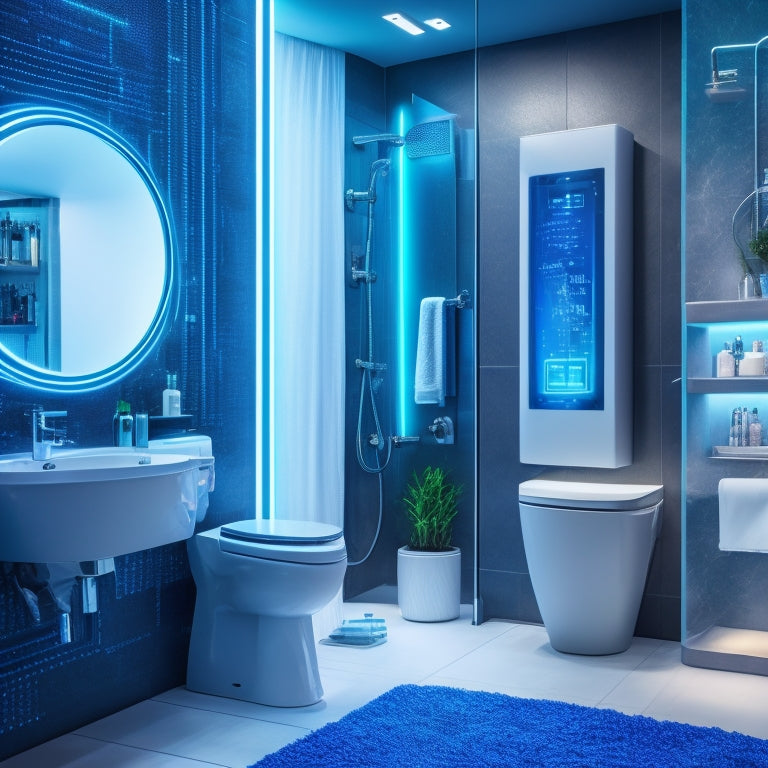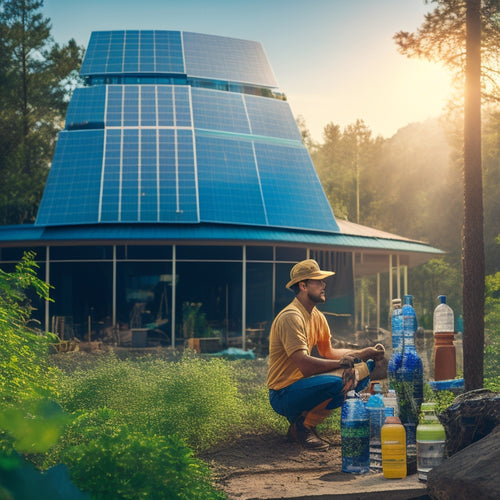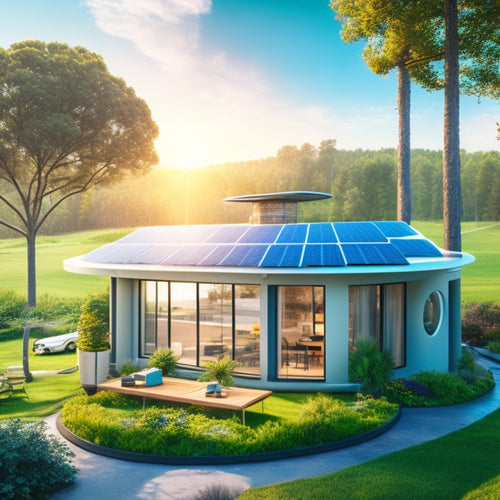
7 High-Tech Ways to Slash Your Water Usage
Share
You can notably reduce your water usage by leveraging high-tech solutions. For instance, smart meters track your consumption patterns in real-time, while AI-powered leak detection systems identify hidden water loss and send alerts for prompt action. Automated irrigation scheduling tools and rain sensors optimize watering schedules, and water-efficient showerheads, grey water recycling systems, and advanced toilet flushing mechanisms contribute to considerable water savings. Additionally, smart devices and data analytics provide useful observations into your water usage patterns. By adopting these state-of-the-art technologies, you'll not only save money but also make a positive impact on the environment - and that's just the beginning of your water-conserving expedition.
Key Takeaways
- Smart meters track water consumption in real-time, identifying inefficiencies and promoting user engagement for sustainability and cost savings.
- AI-powered leak detection systems detect hidden water loss, sending real-time alerts and automating water shut-off to prevent further damage.
- Automated irrigation scheduling tools optimize water usage through customized schedules, integrating with drip irrigation and rain sensors to reduce evaporation and waste.
- Water-efficient fixtures and systems, such as low-flow showerheads and dual flush toilets, reduce water consumption and conserve potable water.
- Grey water recycling systems reuse grey water from sinks, showers, and washing machines, conserving potable water and reducing water bills.
Smart Meters for Real-Time Tracking
Monitoring your water usage in real-time is now a reality, thanks to advanced smart meters. These innovative devices utilize smart technology to track your water consumption patterns, providing you with important revelations to optimize your usage.
By analyzing data analytics, you can identify areas of inefficiency and make informed decisions to reduce your water usage. As businesses adopt sustainable practices, understanding recycling costs is essential for environmental compliance and minimizing waste.
Additionally, effective recycling programs can greatly reduce waste disposal costs and promote a circular economy. In residential applications, smart meters promote user engagement, encouraging individuals to take an active role in minimizing their environmental impact.
As a result, you can expect considerable cost savings and behavioral changes that contribute to sustainability initiatives. By embracing this technology, you're not only reducing your water bills but also doing your part to conserve this precious resource.
AI-Powered Leak Detection Systems
You can markedly reduce water waste by leveraging AI-powered leak detection systems, which use machine learning algorithms to detect hidden water loss.
For instance, electrical infrastructure upgrades are essential for supporting increased power demand, and similarly, AI-powered leak detection systems can support increased water efficiency.
These systems send you real-time leak alerts, enabling you to respond promptly to issues.
In addition, some advanced systems can even automate water shut-off, preventing further damage and waste.
Detecting Hidden Water Loss
Leaks in your plumbing system can be stealthy water wasters, silently draining your resources and increasing your utility bills. To combat this, you can employ advanced water loss detection methods.
By incorporating fast-charging infrastructure solar-powered charging into your plumbing maintenance routine, you can reduce downtime and minimize water waste. Moisture sensors can be installed to detect even the slightest changes in humidity, alerting you to potential leaks.
Regular plumbing inspections can also help identify issues before they become major problems. Additionally, leak detection technology such as acoustic leak detection, thermal imaging, and pressure monitoring can pinpoint the source of leaks.
Real-time Leak Alerts Sent
Advanced AI-powered leak detection systems take water loss detection to the next level by sending real-time alerts to your smartphone or computer the moment a leak is detected. This instantaneous notification allows you to respond quickly and minimize water waste.
With these systems, you'll receive timely alerts, reducing the likelihood of extensive damage and unnecessary expenses. By optimizing energy production through strategic solar panel array design and selecting energy-efficient charging equipment, you can also reduce your overall energy costs energy-efficient solutions.
You'll get notified via email, SMS, or mobile app, ensuring you're always informed. Customizable notification systems let you choose how and when you're alerted.
Real-time monitoring enables you to identify and address issues promptly. AI-driven analytics help you understand your water usage patterns, enabling you to make data-driven decisions.
Automated Water Shut-Off
Water management systems just got a whole lot smarter with the integration of automated water shut-off capabilities in AI-powered leak detection systems.
You'll no longer have to worry about undetected leaks wasting water and driving up your utility bills. These advanced systems can automatically shut off the water supply the moment a leak is detected, minimizing damage and saving you money.
By going solar, you can reduce grid reliance and even generate clean energy to power your water management system, making it even more eco-friendly.
Plus, with smart home integration, you can receive real-time notifications and monitor your water usage remotely. This feature is especially useful for usage cost analysis, allowing you to identify areas of inefficiency and optimize your water consumption.
Automated Irrigation Scheduling Tools
With the help of automated irrigation scheduling tools, you can optimize your water usage by ensuring that your lawn and garden receive the right amount of water at the right time.
These tools use weather data, soil moisture levels, and other factors to create a customized watering schedule. By automating your irrigation, you can avoid overwatering and underwatering, which can lead to wasted water and unhealthy plants.
- They integrate with drip irrigation systems to deliver water directly to the roots, reducing evaporation and runoff.
- They use real-time weather data to adjust watering schedules accordingly.
- They monitor soil moisture levels to prevent overwatering.
- They allow you to remotely adjust your watering schedule to accommodate changing weather conditions.
Rain Sensors for Precise Watering
By taking your irrigation system to the next level, you can assure that your lawn and garden receive the right amount of water at the right time, every time.
Rain sensors are the key to precise watering. These sensors detect rain and automatically adjust your irrigation schedule to guarantee you're not overwatering. This means you'll reduce waste and conserve water for when it's really needed.
By integrating rain sensors with rainwater harvesting systems, you can collect and store rainwater for future irrigation use. This irrigation optimization technique not only saves water but also reduces your water bill.
Plus, it's an eco-friendly way to maintain a healthy lawn and garden while enjoying the freedom to use water responsibly.
Water-Efficient Showerhead Technology
Your daily shower routine can become a significant contributor to water conservation efforts, thanks to innovative water-efficient showerhead technology. By incorporating eco-friendly designs, you can reduce your water usage without sacrificing performance.
-
Look for showerheads with flow rates of 2.5 gallons per minute or less, which can save up to 2.5 gallons of water per minute.
-
Showerhead innovation has led to the development of low-flow showerheads that use advanced aerodynamics to create a satisfying shower experience while using less water.
-
Some showerheads feature advanced pressure-compensating technology, which guarantees a consistent flow rate even at low water pressures.
- Additionally, consider showerheads with built-in flow regulators, which can further reduce water usage.
Grey Water Recycling Systems
Grey water recycling systems offer a promising solution for reducing water waste in households. You can conserve significant amounts of potable water by reusing grey water, which is the wastewater generated from sinks, showers, and washing machines.
Grey water benefits include reduced water consumption, lower water bills, and a smaller carbon footprint. However, it's crucial to comply with grey water regulations, which vary by region.
You'll need to install a grey water system that meets local standards and guarantees the water is treated and stored safely. With the right system, you can irrigate your garden, flush toilets, and even wash cars, all while enjoying the freedom to conserve this precious resource.
Advanced Toilet Flushing Mechanisms
How much water can you really save with a toilet that's smarter than the average loo? Advanced toilet flushing mechanisms can make a considerable impact on your water consumption.
Dual flush toilets, for instance, allow you to choose between a full or partial flush, depending on your needs. This can lead to a considerable reduction in water usage over time.
Some advanced features to look for in a toilet include:
- Pressure assisted flushing, which uses compressed air to force waste down the drain, reducing water usage
- Sensors that detect when you're done and automatically flush the toilet
- Self-cleaning mechanisms that reduce the need for harsh chemicals
- Water-efficient designs that use considerably less water per flush
Frequently Asked Questions
Can I Install These Systems Myself or Do I Need a Professional?
You can attempt a DIY installation, but consider seeking professional assistance if you're not comfortable with plumbing or electrical connections, as improper setup can lead to system failures or even water damage.
How Much Does It Cost to Implement These Water-Saving Technologies?
As you take the reins on reducing your water footprint, you'll find the initial investment in these technologies can be a bitter pill to swallow, but it's a drop in the bucket compared to the long-term savings that will flow in.
Are These High-Tech Systems Compatible With My Existing Plumbing?
You're wondering if these innovative systems will mesh with your existing plumbing setup. Fortunately, most high-tech water-saving solutions are designed for seamless technology integration, ensuring plumbing compatibility and a hassle-free installation process that won't disrupt your daily routine.
Do These Systems Require Regular Maintenance or Upkeep?
You'll be relieved to know that 75% of households ignore maintenance, leading to costly repairs. Fortunately, these systems boast high system reliability, requiring minimal maintenance frequency, with some models only needing annual checks, giving you more freedom to focus on what matters.
Can I Customize These Systems to Fit My Specific Water Usage Needs?
You can tailor water-saving solutions to your unique needs by leveraging smart water meters that track your usage patterns, allowing you to set personalized settings that optimize conservation and freedom from unnecessary waste.
Related Posts
-

What Tax Deductions Apply to Sustainable Building Materials?
You can claim various tax deductions for sustainable building materials, thanks to over 40 federal tax incentives sup...
-

Why EVs Inspire Earth-Conscious Home Design Choices
As you shift to an electric vehicle, you're not just switching to a greener ride, you're igniting a broader commitmen...
-

Gamify Your Home's Energy Generation and Savings
You're taking the next step in optimizing your home's energy generation and savings by utilizing the power of gamific...


